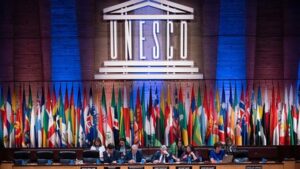
Vegetable oils accounted for 23% of Ukrainian exports in 2024, 60.9% of which went to European countries, according to the Ukrainian Agribusiness Club (UAC).
Analysts noted that 15% of vegetable oil exports from Ukraine were delivered to the Middle East, 14.8% to Southeast Asia, 4.8% to Africa, 3.1% to Asia (other countries), and 1.4% to America.
At the same time, sunflower oil accounted for 89.0% of exports, soybean oil for 5.5%, rapeseed oil for 4.2%, and others for 1.3%.
The UACB noted that sunflower oil accounts for the lion’s share (89%) in this category, which confirms Ukraine’s status as a key player in the global market for this product, while the share of soybean and rapeseed oils is also gradually increasing.
After record revenues of $7.04 billion from oil exports in 2021, even in the context of full-scale war, export revenues consistently exceed $5.6 billion annually. The 2024 figure ($5.76 billion) confirmed that this sector has not only survived but also successfully adapted to the new realities, remaining a reliable pillar of the economy, the business association emphasized.
At the same time, unlike raw material groups, vegetable oils as a processed product have a more diversified geography. Although Europe remains the leader, the total share of Asian and Middle Eastern countries exceeds 30%, which indicates the demand for Ukrainian oil in distant markets. The global demand for Ukrainian oil is confirmed by the overall improvement in export logistics and the increase in the number of importing countries, which rose to 139 in 2024 (compared to 133 in 2023).
“Vegetable oils remain a significant driver of Ukraine’s foreign trade among value-added products. One of the critical factors for exports remains the issue of the availability of logistics routes,” the association emphasized.
The UACB recalled that in 2024, the deep-water ports of the Black Sea regained their dominant position, accounting for almost half of all exports (compared to less than 15% in 2023), but alternative export channels—the Danube ports and the “Solidarity Routes”—continue to play a significant role, accounting for over 45% of shipments.

The Verkhovna Rada’s Temporary Investigation Commission on Investor Rights Protection insists that customs and law enforcement agencies respond to the situation with Ukraine’s import of roses, 95% of which cross the border illegally, said the chair of the Temporary Investigation Commission, People’s Deputy (Servant of the People) Galina Yanchenko.
“Flower mafia”: 95% of imported roses in Ukraine are brought in illegally. As a parliamentary special commission, we demand a response to this problem from customs and law enforcement agencies,” she wrote on her Facebook page.
According to Yanchenko, on Wednesday, the Temporary Investigation Commission held a meeting on the protection of investors’ rights, dedicated to the situation with flower smuggling.
“Miracles” really do happen with roses entering Ukraine. Six months ago, after receiving complaints from businesses, we compared Ukrainian customs data with European databases and saw systematic abuses: massive underestimation of customs value, budget losses of more than UAH 600 million over three years, and the destruction of domestic producers through smuggling and dumping. In other words, we are not just dealing with customs schemes, but an attempt to kill Ukrainian floriculture,” the MP noted.
Yanchenko said that the materials collected by the Temporary Investigation Commission have already formed the basis of criminal proceedings by the Economic Security Bureau, with preliminary estimates of at least UAH 100 million in abuses.
“But this is not enough. We expect real investigations and the perpetrators to be brought to justice. If the situation does not change, we will join forces with law enforcement agencies to conduct joint raids and inspections of suspicious cargo at customs,” warned the chair of the Temporary Investigation Commission, reminding everyone that every hryvnia counts during wartime.
The Temporary Investigation Commission meeting was attended by representatives of the State Customs Service, the Economic Security Bureau, the State Bureau of Investigation, the Office of the Prosecutor General, as well as Ukrainian manufacturers and importers.
As reported, in 2021, Ukraine introduced a special duty on imports of cut fresh roses for three years, regardless of the country of origin and export. The duty rate in the first year of its operation was 56%, in the second – 44.8%, and in the third – 35.84%.
Based on the results of the duty’s impact provided by the Ministry of Economy, the Interdepartmental Commission on International Trade (ICIT) concluded that the application of special measures had a positive effect on the activities of domestic producers, but did not completely eliminate the consequences of the damage caused to them. Therefore, recommendations to extend the duty have been submitted to the ministry.

According to Serbian Economist, Serbia’s commercial real estate market will develop around Belgrade and expressway and railway corridors over the next decade, with the most dynamic growth expected in the office and industrial-logistics segments, according to the analytical report “Serbia real estate & construction outlook 2025–2035.”
According to the document, by 2035, Belgrade’s high-quality office stock could increase to 1–1.2 million square meters. The main demand will be provided by IT companies, engineering centers, the financial sector, and international service centers, while in Novi Sad and Niš, more compact clusters of office space focused on technology and research are forming.
The report identifies industrial and logistics real estate as the fastest-growing segment. Experts predict that by 2035, the total volume of modern warehouse space in Serbia could double or triple, with key logistics hubs forming in the Belgrade–Pancevo–Simanovci, Novi Sad–Ruma–Inđija, Kragujevac–Kraljevo, and Niš–Leskovac, as well as along international corridors X and XI.
Individual industry reviews confirm the stability of the industrial segment: according to consulting company iO Partners, in the first quarter of 2025, there were more than 1.2 million square meters of Class A warehouse space on the Serbian market, with vacancy rates remaining at around 6.5% and base rental rates at €5 per sq m per month, indicating a balanced supply and demand structure.
The report identifies potential delays in infrastructure projects, high financing costs, and political cycles that could affect the timing of major development programs as risks for commercial real estate. As strategic recommendations, investors are advised to focus on energy-efficient offices and industrial parks linked to international transport corridors, while the authorities are advised to accelerate the harmonisation of building standards with EU requirements and the digitisation of procedures for commercial projects.

Kyivstar, Ukraine’s largest mobile operator, will gradually update certain tariffs from December 18 this year and throughout early 2026 to compensate for the rising cost of key resources.
“Starting December 18, 2025, and throughout early 2026, the terms of some subscription rates will be gradually updated, and starting January 1, 2026, and over the course of several months, some contract and business rates will also be updated,” the company said.
It is noted that these conditions are being introduced due to the rise in the cost of key resources, in particular, electricity for businesses, which has risen by 60% during evening peak hours.
The technical community of the telecommunications market “Mobile Communications of Ukraine” reported on Telegram that the new tariffs will affect, among other things, the LOVE UA line. Specifically, LOVE UA Base will increase from 150 UAH to 200 UAH/4 weeks, LOVE UA Bezlim 2024 from 225 UAH to 300 UAH, LOVE UA Pesnya 2024 from 250 UAH to 300 UAH, LOVE UA Svet 2024 from 200 UAH to 260 UAH, LOVE UA Light 2024 (with the superpower Economy) will increase from 150 UAH to 200 UAH, and the LOVE UA Freedom 2024 tariff will increase from 125 UAH to 190 UAH.
Among other changes, the operator announced the expansion of the “Roaming as at home” service from 28 to 32 countries, including Iceland, Norway, Liechtenstein, and Cyprus, starting December 18.
For subscribers abroad, roaming limits of UAH 2,000 and UAH 4,000 will be introduced from January 1, which will help avoid unexpected Internet costs.
As reported, Kyivstar received EBITDA of UAH 7.1 billion in the third quarter of 2025, which is 21.5% more than in the third quarter of 2024, and in dollars, the growth was 20.4% to $171 million.
Kyivstar served 22.5 million mobile subscribers in the third quarter of 2025, which is 3.6% less than a year earlier, but the number of 4G customers grew by 2.4% to 15 million.

19 Ukrainian sites have been added to UNESCO’s International List of Cultural Property under Enhanced Protection, bringing the total number of Ukrainian sites on the list to 46, according to Deputy Prime Minister for Humanitarian Policy and Minister of Culture of Ukraine Tatyana Berezhnaya.
“The UNESCO Committee for the Protection of Cultural Property in the Event of Armed Conflict has just supported Ukraine’s initiative and adopted a corresponding decision. This is an important international victory and recognition of how responsibly Ukraine complies with international humanitarian law even during a full-scale war,” Berezhna wrote on Facebook on Thursday.
According to her, the total number of Ukrainian sites on the list has increased to 46. “This makes Ukraine one of the countries with the largest list of cultural heritage sites under the highest international legal protection in the field of humanitarian law,” the minister emphasized.
Berezhna noted that enhanced protection is the highest level of international legal protection provided for by the Second Protocol to the 1954 Hague Convention. Sites that receive this status must meet three key requirements: be of exceptional importance to humanity; be protected at the national level; and not be used for military purposes.
“In the context of full-scale Russian aggression, Ukraine has become the first country in the world to apply the mechanism of enhanced protection on a large scale during wartime, setting a new precedent in international practice,” the Minister of Culture emphasized.
According to her, it was also on Ukraine’s initiative that a discussion began last year on international legal responsibility for violating the immunity of objects under enhanced protection. The results of the study, conducted by a group of international experts, were presented during the 20th Session of the Second Protocol Committee.
The following sites were added to the Enhanced Protection List: Akkerman Fortress, Belgorod-Dnestrovsky, Odessa Region; Uspensky Cathedral, Kharkiv; Borisoglebsky Cathedral, Chernihiv; Kharkiv Academic Ukrainian Drama Theater named after Taras Shevchenko, Kharkiv; Church Building (St. Paul’s Church), Odessa; L.E. Kenig’s Estate: Palace (Main House), Trostyanets, Sumy Region; Molchansky Monastery, Putivl, Sumy Region; Pokrovskaya Church, Kharkiv; Primorsky Staircase, Odessa; Voskresenskaya Church, Sumy; Kirillovskaya Church, Kiev; Spaso-Preobrazhensky Cathedral, Sumy; Troitsky Cathedral, Sumy; The site of the chronicle city of Iskorosten, Korosten village, Zhytomyr region; The archaeological complex “Ostrov Baida,” Zaporizhia; Odessa Museum of Western and Eastern Art, Odessa; Odessa National Art Museum, Odessa; Odessa National Scientific Library, Odessa; Museum of Carpathian Art, Ivano-Frankivsk.
“Violating the ‘immunity’ of such sites is a serious international crime and entails double responsibility – both for the state and for individuals,” Berezhnaya noted.
Berezhna expressed her gratitude to UNESCO for its support of Ukraine, to Deputy Minister of Culture Anastasia Bondar, as well as to Lina Doroshenko and the entire team for their work. “I would also like to thank my colleagues from the Ministry of Foreign Affairs of Ukraine / MFA of Ukraine for their coordinated work,” she added.

Ukraine could attract up to €4 billion in private investment and create more than 17,000 jobs thanks to innovative construction, which includes the use of geopolymers, hempcrete, and 3D printing, according to a report by the International Finance Corporation (IFC) of the World Bank Group, “Rebuilding Ukraine: Opportunities for Investment in Innovative and Sustainable Construction.”
“As of the end of 2024, 13% of the total housing stock had already been damaged or destroyed, and a significant part of the country’s infrastructure had been affected in all major sectors (e.g., energy, transport, telecommunications, industry, social sector). The total investment needs for restoration and reconstruction were estimated at over $0.5 trillion over a decade, with housing accounting for the largest share,” the report says.
The IFC emphasizes that reconstruction creates an opportunity to build housing in a better and more efficient way, and the study identifies promising building materials and technologies that can help achieve this and build hundreds of millions of square meters of new, energy-efficient construction.
At the same time, the authors of the document note that private investment in innovative construction is hampered by a number of obstacles, including regulatory barriers, limited access to financing, low levels of education in the industry, and a shortage of skilled workers.
According to the study, Ukraine needs additional production capacity: 8 million tons of geopolymers, with an estimated investment of $1.36 billion, 6 million square meters of precast reinforced concrete – $1.5 billion, 0.7 million tons of basalt wool – $420 million, 0.1 million tons of basalt reinforcement – $420 million.
This list also includes the creation of capacity for the production of 0.5 million tons of hemp concrete, which requires $20 million in investment, 1 million cubic meters of autoclaved aerated concrete (AAC) – $100 million, 3D printing for construction – $50 million, and special glazing for 8 million square meters – $72 million.
3D PRINTING, geopolymer, innovative construction, INVESTMENT